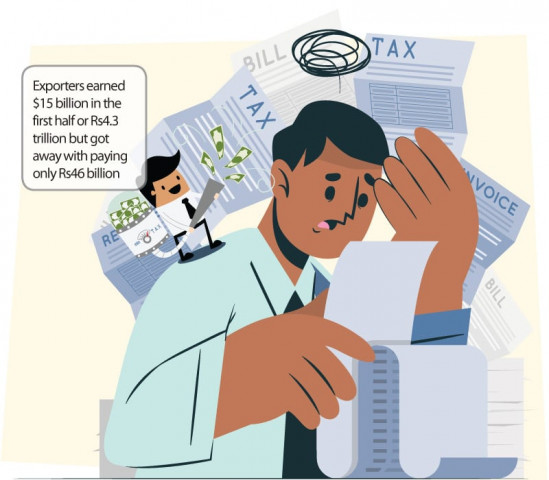Salaried class has high tax share
Workers contribute more than exporters at Rs158b, marking 38% increase

Pakistan’s inflation-burdened salaried class remained the fourth-largest income tax contributor during the first half of this fiscal year, paying Rs158 billion in taxes—a sum now 243% higher than the tax contribution by the richest subsidised exporters.
There was a 38% increase in income tax collection from the salaried class during the July-December period of this fiscal year compared to a year ago, according to data compiled by the Federal Board of Revenue.
The salaried class’s tax contribution significantly increased amid a one-month-old recommendation by a technical mission of the International Monetary Fund to further increase the tax burden on salaried individuals.
Out of Rs158 billion, an amount of Rs66 billion or 42% of the salaried class’s contribution came from those persons registered in the province of Sindh. People living in one city are often registered for tax purposes in the cities where their companies have headquarters.
FBR data showed that during the first half of fiscal year 2023-24, salaried persons paid nearly Rs158 billion in taxes. The amount paid by the salaried class was Rs43.4 billion or 38% higher than the preceding year.
In the last fiscal year, salaried persons had paid Rs264 billion in taxes, and the current trend suggests that their contribution crossed well over Rs300 billion in this fiscal year.
Salaried people remained the fourth-largest contributors to withholding taxes after contractors, bank depositors, and importers. In the budget, the government, for the second time in one year, increased taxes on salaried people earning more than Rs200,000 a month.
Last month, the IMF urged Pakistan to cut the number of tax slabs for the salaried and business class from the existing seven to four—a proposal, if accepted, will hurt the middle and upper-middle-income groups. The proposal was floated by a technical mission of the IMF that completed its two-week review of Pakistan’s tax policies in December.
The IMF Resident Representative Esther Perez did not respond to a query regarding the recommendation of the technical mission to reduce the number of personal income tax slabs. But she had told Reuters that there was no such proposal at this stage. The Express Tribune had reported that the IMF’s recommendation would become the base for the next budget.
The salaried class’s tax burden has been increased at a time when inflation remains at one of the highest levels, and people’s purchasing power has significantly shrunk due to a massive increase in prices of electricity, gas, heating, and food.
During the first half of this fiscal year, the FBR collected over Rs1.25 trillion on account of withholding taxes, which were equal to 57% of the total income tax that the FBR generated during the period under review.
Read Salaried class pays nearly 200% more tax than exporters, retailers
The FBR is now in the process of expanding the tax base to the under-taxed sector and is expected to target about one million non-filers doing business in the country.
The maximum amount of income tax collected was from contractors, saving account holders, importers, salaried persons, electricity bills of non-filers, telephone & mobile phone users, and dividend income.
But exporters paid only Rs46 billion in taxes during the first half—an amount that was 243% less than the tax contribution of salaried persons.
Exporters earned $15 billion in the first half or Rs4.3 trillion but got away with paying only Rs46 billion in taxes at a rate of 1%. Exporters’ representatives claimed that their effective rate was almost equal to the salaried class’s maximum rate of 35%. The claim is not independently verified.
The IMF is also wrongly putting more burden on the salaried class, which, unlike the exporters and retailers, does not have a voice in the power corridors.
Tax collection from contractors and service providers jumped by 31% to Rs228 billion in the first half of this fiscal year—the highest contribution.
The collection on account of profit on debt jumped 58% to Rs220 billion in six months. The increase suggests the impact of higher interest rates and people’s tendency to save money. Banks charge 10% to 50% income tax rates on these savings accounts on behalf of the FBR.
Importers paid Rs189 billion in income tax on various types of imports—the third-largest contributor to withholding taxes.
Provincial share
Out of Rs158 billion salaried tax collections, Rs66 billion or 42% was collected by field formations of the FBR based in Sindh. People registered with Karachi tax offices paid the highest amount of Rs57 billion or 36% of the salaried taxes.
Punjab-registered taxpayers contributed Rs59.4 billion or 38% of the salaried tax with the share of Lahore standing at nearly Rs33 billion. Islamabad tax offices collected Rs19 billion from the salaried persons. The contribution of Balochistan-registered salaried persons was Rs4.2 billion, and Rs9 billion was collected from Khyber-Pakhtunkhwa registered salaried persons.
Published in The Express Tribune, January 7th, 2024.
Like Business on Facebook, follow @TribuneBiz on Twitter to stay informed and join in the conversation.



















COMMENTS
Comments are moderated and generally will be posted if they are on-topic and not abusive.
For more information, please see our Comments FAQ